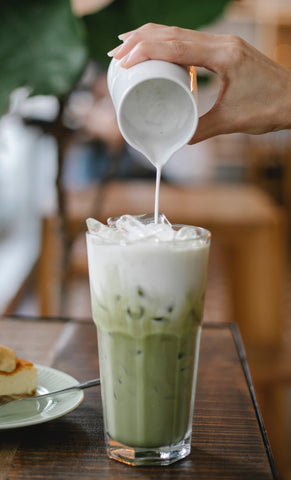Finding the Best Milk for Matcha Lattes
For those who love matcha lattes, finding the best milk for matcha latte is critical to make that matcha green tea latte taste oh-so-good.
While some milks and milk substitutes complement matcha to bring out the umami flavors, others make our favorite beverage unpalatable.
Here’s a list of our favorite pairings with Bonsai Cha matcha and some words of caution when choosing the right milk for your daily matcha latte.

Whole Milk, Low Fat or Fat Free Milk for Your Matcha Latte
If you’re looking to indulge in a rich and creamy matcha latte, whole milk is a great option. The only downside of using whole milk is that it may overpower certain delicate flavors of matcha. Whole milk also has the highest in fat and calories, and has a rich, creamy flavor. It can add a decadent richness to your matcha latte, but it may also contribute to weight gain if consumed in excess.
Reduced-fat milk, also known as 2% milk, is lower in fat and calories than whole milk. It has a similar consistency to whole milk and can be used in place of whole milk in a matcha latte.
Fat-free milk, also known as skim milk, is the lowest in fat and calories. It has a lighter, more watery consistency than whole or reduced-fat milk and may not be as creamy in a latte.

Coconut Milk for Your Matcha Latte
Although rich and creamy, coconut milk curdles when heated and does not foam well so it is best used for iced matcha lattes. We love how the creamy coconut flavor pairs well with a stronger matcha with balanced astringency to provide a refreshing iced beverage.
Some people love the rich and creamy texture of coconut milk and matcha, but it also high in saturated fat, so it should be consumed in moderation. You may want to try using a reduced-fat coconut milk or diluting regular coconut milk with water to reduce the fat and calorie content of your latte. Alternatively, you could try using a coconut milk alternative, such as coconut milk beverage, which is lower in fat and calories.

Oat Milk for Your Matcha Latte
Oat milk has a lighter taste profile and compliments matcha well as it allows the flavors of matcha to shine through. Oat milk is a newer plant-based milk that is becoming increasingly popular. It has a creamy, oaty flavor and is a good choice for those with lactose intolerance or other dietary restrictions. Be careful of some brands that offer sweet versions of the beverage as the sweetness will drown out the taste of the matcha.

Almond Milk for Your Matcha Latte
This is one of our favorites to blend in your matcha latte. Almond milk has a similar texture compared to regular milk with a fraction of the calories. It also has a sweet and slightly nutty undertones which complements matcha well. When added to your matcha latte, it will provide a creamy and rich texture.
Be wary of some almond milk brands that are overly sweet or watery as they will make your matcha latte taste awful. We recommend opting for unsweetened versions. Another great alternative is Macadamia Milk which provides a sweeter and creamier consistency. Or you may choose to opt for another nut milk variety like Cashew Milk.

Soy Milk for Your Matcha Latte
Soy milk is another great milk alternative and has a slightly nutty, earthy flavor that can complement the grassy flavor of matcha. However, it is not our top pick for matcha lattes. Some brands we find can have an overpowering, beany taste which washes out the taste of matcha. You will also need to watch out for curdling at higher temperature. If you are opting for soy, experiment with brands or opt for brands that offer lighter versions of the beverage.

Which Milk is the Best Match for Your Matcha Latte?
Which milk is the best for your matcha latte? Every person is different, so there really is no "right" answer. The best milk to use in your matcha latte all depends on your dietary needs and personal taste and health preferences. If you're looking to reduce the calorie and fat content of your latte, you may want to opt for reduced-fat or fat-free milk. You may also opt for a non-dairy alternative like almond milk.
If you prefer the taste and richness of whole milk or coconut milk, you can use it in your latte, but be mindful of your overall intake of saturated fat. You may also want to experiment using a plant-based milk blends such as coconut and almond which can add a unique flavour to your matcha latte!
Want the perfect matcha latte?
Make the perfect matcha latte with the Bonsai Cha Matcha Maker.
Also be sure to give Bonsai Cha matcha a try!

